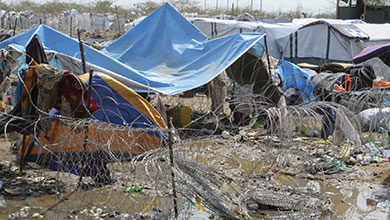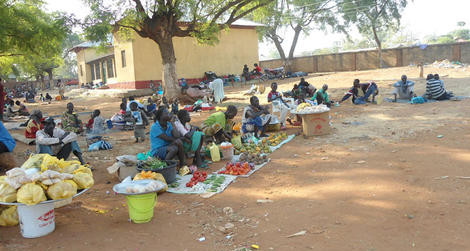
By Ann Marie Foley - 24 April, 2014
 Bishop William Kenney of Birmingham is the latest church leader to call for an end to the violence and suffering in South Sudan.
Bishop William Kenney of Birmingham is the latest church leader to call for an end to the violence and suffering in South Sudan.
His call comes after Pope Francis prayed on Easter Sunday for peace in the African country.
The Bishop of Birmingham has just returned from a visit to South Sudan where he heard the disturbing news of violence in the Benitu region which left hundreds of women, children and men dead after they sought refuge in a hospital, a mosque and a Catholic church.
“While the warring factions delay in finding a lasting solution to this conflict, ordinary people have been catapulted into dire suffering, unable to return to their homes and farm their land, they are now crammed into church and UN compounds, in urgent need of food, clean water and shelter,” Bishop Kenney said.
Church leaders within South Sudan itself have also called for greater progress in the peace talks as more than a million people have been displaced and almost five million are in need of humanitarian aid.
“We are saddened by the delay and the lack of progress in the peace talks in Addis Ababa, and we are horrified by the ongoing armed mobilisation by the conflicting parties in and outside the country,” the pastoral statement of the ecumenical church leaders of South Sudan said.
The statement condemns the ongoing violence and expresses a hope for peace and an inclusive political dialogue and a reconciliation process.
“We envision a country where justice, liberty and prosperity for all shall truly reign; a country where people will live long and children will not die young and senselessly,” the statement continues.
 Their call comes as several faith-based humanitarian agencies have warned of an impending food crisis, not least because as the crisis response plan is still only 36 percent funded.
Their call comes as several faith-based humanitarian agencies have warned of an impending food crisis, not least because as the crisis response plan is still only 36 percent funded.
Trócaire, Christian Aid, Tearfund and CAFOD are responding to the crisis working through national partners and churches to provide humanitarian assistance in the badly affected areas.
They are involved in food distribution, and providing nutrition, water, sanitation, child protection, and health.
Trócaire has just published a blog by Faith Kasina who interviews a 25-year-old called Salome Amira.
She explained that she cannot go back to her home until it is safe. When fighting broke out in December 2013 she was forced to leave behind a stable life and thriving perfume business and now lives at UN house in Juba 3 IDP camp with her husband and their one-year-old son.
The IDP camp is home to over 12,000 families, seeking refuge from conflict-stricken areas. Approximately 803,000 South Sudanese live in 174 displacement sites across the country.
Salome remembers a different South Sudan not too long ago.
“We all lived peacefully, coming from different tribes and parts of South Sudan and supporting different leaders,” Salome said.
“It seems we have forgotten that. Now, my own neighbours can’t accept my family and me because of the language we speak.”
For many South Sudanese, gaining independence from Sudan in 2011 was a moment of joy and hope for a fresh start after years of conflict and war. The present crisis has opened up old wounds.
“Sadness, distress and pain is the exact feeling of every South Sudanese today,” according to Isaac Kenyi from the Justice and Peace Commission (JPC) that Trócaire supports.
JPC represents the Catholic church in the ongoing peace talks in Ethiopia and ensures that the position of the church, and the voice of South Sudanese is heard.
Through local parishes, theatre performances and radio programmes, the JPC communicates with local communities on the progress of the peace talks, while advocating for peaceful co-existence at local level.
Christian Aid has expressed concern that many families have missed the planting season as they have been displaced through violence.
“We are extremely concerned about the implications for the seven million people who are at risk of food insecurity,” said Natalia Chan, Christian Aid’s senior advocacy and policy officer for East Africa.
“Once the rainy season is upon us, two thirds of the country will be cut off – we need immediate action now or the situation will get much worse.”
CAFOD’s country representative for South Sudan, Jane Andanje, said that ending the conflict through a sustainable, negotiated settlement is the only way to give people the security they need to return to their homes and fields, and begin to rebuild their lives.
“We call for the continued prayers of the faith community,” she said.
Andy Morgan, deputy head of the East and Southern Africa Region within Tearfund, highlighted that this message also comes at Easter – a time of new life and new beginnings.